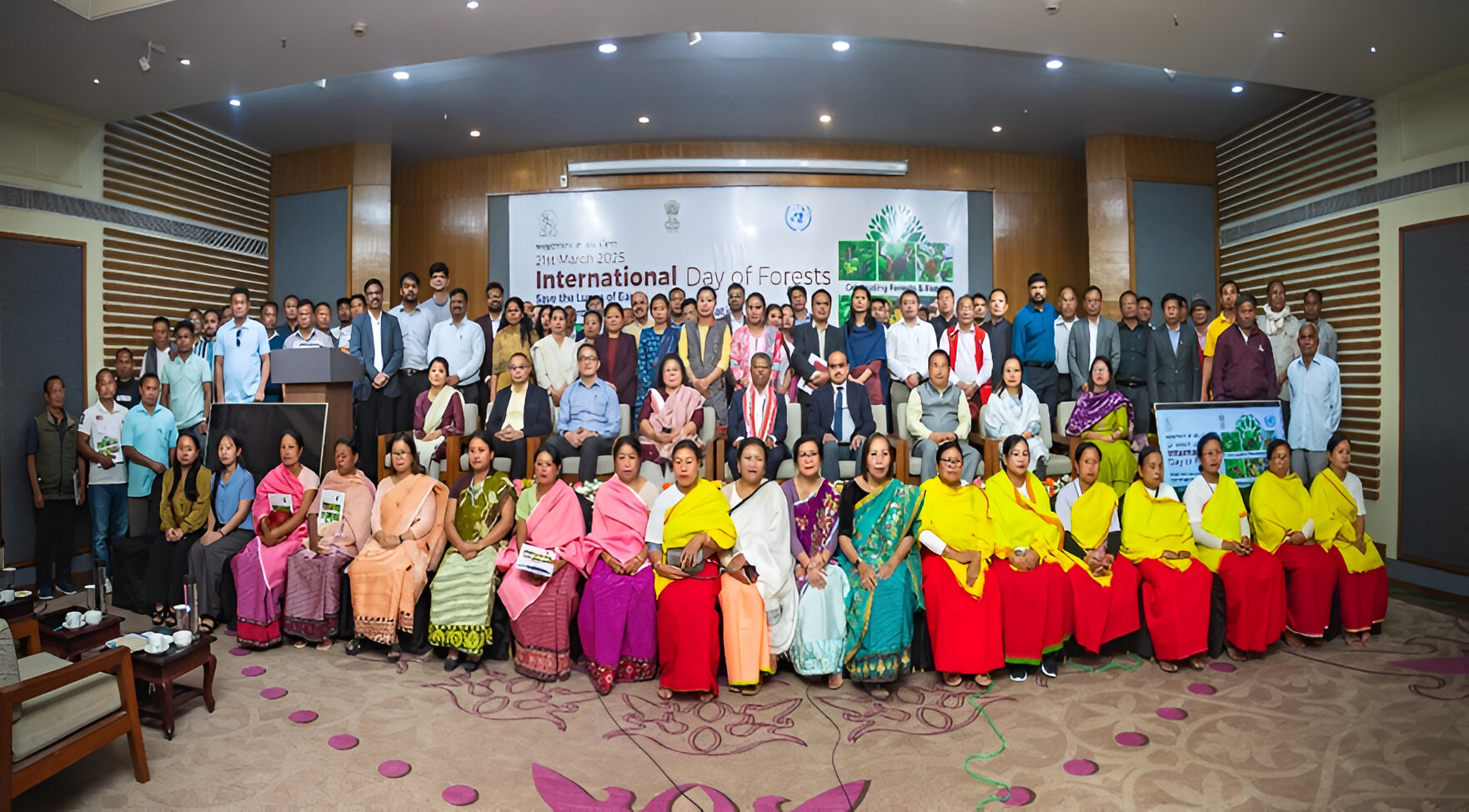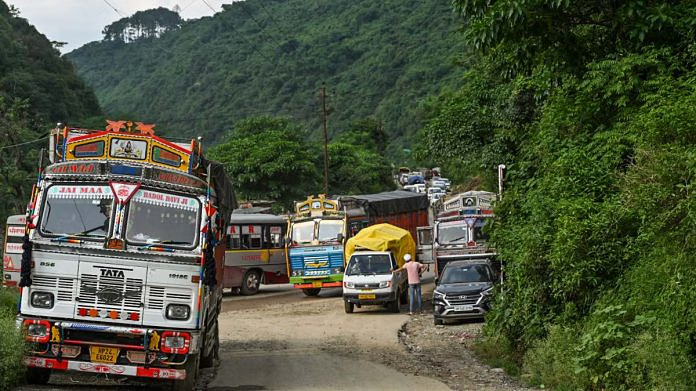Manipur Forest Department Celebrates International Day of Forests, Showcasing the Role of Forests in Food Security
On March 21, 2025, the Manipur Forest Department commemorated the International Day of Forests with a grand event at the Classic Grande, Chingmeirong, Imphal. The celebration emphasized the indispensable role forests play in ensuring food security and sustaining livelihoods.
A Celebration Rooted in Tradition and Sustainability
The event commenced with the ceremonial watering of the Heirengoi plant, symbolizing a deep commitment to forest conservation and sustainable practices. This act set the tone for the day’s proceedings, highlighting the intrinsic connection between cultural traditions and environmental stewardship.
Exhibiting the Bounty of Forests
An exhibition showcased a diverse array of forest-based products from various districts of Manipur. Members of Van Dhan Vikas Kendras (VDVKs) presented their products, illustrating the economic potential of sustainable forest resource utilization. This display underscored how forest-based industries can generate livelihoods and promote economic growth within local communities.
Insights from Keynote Speakers
Anurag Bajpai, Principal Chief Conservator of Forests & HoFF, delivered the keynote address, emphasizing the critical importance of forests in maintaining biodiversity and enhancing food security. He highlighted the rich natural resources that forests provide and urged collective responsibility in conservation efforts. Arun Kumar Sinha, Principal Secretary (Forest, Environment & Climate Change), addressed the challenges posed by climate change and rising temperatures, while also highlighting the market potential of VDVK products and strategies to explore new opportunities.
Educational Film and Technical Sessions
A short film on Van Dhan Vikas Kendras (VDVKs) was screened, showcasing how forest-based food products are improving the economic conditions of local communities through sustainable harvesting and processing. The event also featured two technical sessions: “Food Security through Forests” by Romabai Waikhom, DFO, Bishnupur, and “Employment Opportunities in Forests” by Debala Leiphrakpam, CF/Eastern Circle, Chairman FDA (Kamjong/Tengnoupal/Chandel). These sessions addressed critical issues related to forests, providing valuable insights into the multifaceted benefits of forest conservation.
Reaffirming Commitment to Sustainable Forest Management
The celebration concluded with a vote of thanks by Vikram Suresh Nadhe, IFS DFO/Central Forest Division, who expressed gratitude to all participants for their active involvement. The event successfully reinforced the crucial role of forests in sustaining life, ensuring food security, and generating livelihoods. The Manipur Forest Department reaffirmed its dedication to sustainable forest management, ensuring a harmonious balance between environmental conservation and community well-being.
Exploring the Intrinsic Connection Between Forests and Food Security: A Deep Dive
Forests are often romanticized as the Earth’s lungs, but their role extends far beyond purifying our air. They are the unsung heroes in the narrative of global food security, playing a pivotal role in sustaining ecosystems, economies, and communities.
The Multifaceted Contributions of Forests to Food Security
Forests are veritable treasure troves of resources that bolster food security in myriad ways:
- Diverse Food Sources: Beyond the obvious fruits and nuts, forests provide a plethora of edible offerings such as mushrooms, honey, insects, and wild game. These resources are vital for the nutrition and cultural practices of many indigenous and local communities. FAOHome
- Ecosystem Services: Forests play a crucial role in maintaining soil fertility, regulating water cycles, and supporting pollinators—all essential components for productive agriculture. IUFRO
- Economic Opportunities: Sustainable harvesting of non-timber forest products offers income-generating opportunities, reducing poverty and enhancing food accessibility.
Manipur’s Commitment to Forest Conservation and Food Security
Manipur’s celebration of the International Day of Forests is a testament to the state’s recognition of the intricate link between forest conservation and food security. The event highlighted several key initiatives and insights:
- Community Involvement: The emphasis on Joint Forest Management Committees (JFMCs) underscores the importance of community participation in forest conservation efforts. This collaborative approach ensures that conservation strategies are both effective and culturally appropriate.
- Economic Empowerment through VDVKs: The showcasing of products by Van Dhan Vikas Kendras (VDVKs) illustrates how sustainable forest resource utilization can lead to economic empowerment. By tapping into the economic potential of forest-based industries, communities can achieve financial stability while promoting conservation.
- Educational Initiatives: The technical sessions and film screenings provided valuable insights into the multifaceted benefits of forest conservation, from enhancing food security to creating employment opportunities.
Global Perspectives on Forests and Food Security
The theme for the International Day of Forests 2025, “Forests and Foods,” resonates globally, highlighting the universal importance of forests in food systems:
- Biodiversity Hotspots: Tropical forests, particularly in Asia and the Pacific, boast the highest diversity of forest foods globally, with over 2,000 species. This biodiversity is crucial for resilient food systems. FAOHome
- Climate Change Mitigation: Forests act as carbon sinks, mitigating climate change impacts that threaten agricultural productivity. FAOHome
- Cultural Significance: For many indigenous communities, forests are integral to cultural identity, traditional knowledge, and culinary practices.
The Role of Biodiversity in Resilient Food Systems
Biodiversity is another key aspect of food security, and forests are biodiversity hotspots. A diverse ecosystem means a variety of species—each playing a unique role in the food chain. In a healthy forest, you’ll find a multitude of plants, insects, birds, and animals that contribute to a balanced environment. This biodiversity not only supports natural pest control and pollination but also provides genetic resources that can be crucial in developing resilient crop varieties. In times of climate uncertainty, such genetic diversity can be the difference between crop failure and success.
Community Empowerment Through Sustainable Forest Management
One of the most inspiring outcomes of the International Day of Forests celebration in Manipur was the empowerment of local communities. When people understand the value of their natural resources, they become active participants in their conservation. The event highlighted how community-led initiatives, such as sustainable harvesting and forest monitoring, can be incredibly effective. By involving local voices in decision-making processes, the Forest Department is paving the way for a future where communities are the custodians of their own resources.
Technology and Tradition: A Harmonious Blend
In today’s fast-paced world, technology often seems at odds with tradition. However, the Manipur Forest Department’s celebration proved that modern technology can complement traditional wisdom. Digital mapping, drone surveillance, and mobile applications are being used to monitor forest health and track changes in biodiversity. These technological tools, when combined with the rich indigenous knowledge of local communities, create a powerful system for sustainable forest management.
Challenges and Opportunities Ahead
Of course, no celebration is without its challenges. Deforestation, climate change, and unsustainable agricultural practices remain significant hurdles. However, the International Day of Forests celebration in Manipur was not just about highlighting problems—it was about exploring solutions. The event provided a platform for discussing policy reforms, investment in green technologies, and the need for stronger community participation in forest management. The conversation was optimistic yet grounded in reality, with a clear message: while the challenges are immense, the opportunities to build a sustainable future are equally promising.
A Vision for the Future: Sustainable Growth and Food Security
Looking ahead, the message from Manipur is clear: protecting our forests is synonymous with securing our food future. The Forest Department’s initiative is a call to action for policymakers, environmentalists, and local communities alike. By investing in sustainable practices, supporting innovative agricultural techniques, and fostering a deep respect for nature, we can ensure that our forests continue to thrive—and with them, our food systems.
Imagine a future where every community has access to fresh, nutritious food because the surrounding forests are healthy and vibrant. It’s a future where technological advancements work hand in hand with traditional practices to create a resilient, sustainable ecosystem. This vision is not just wishful thinking—it is achievable with the right blend of policy, community engagement, and environmental stewardship.
The Cultural Connection: Celebrating Nature in Manipur
Manipur has long been celebrated for its rich cultural heritage, where traditions and nature are deeply intertwined. The celebration of the International Day of Forests tapped into this cultural vein, reminding everyone that forests have always been a part of the local identity. Traditional songs, dances, and storytelling sessions were an integral part of the event, weaving together the threads of culture and conservation. These cultural expressions not only honored the legacy of the land but also served as a reminder of the responsibility to protect it for future generations.
Engaging the Youth: Planting the Seeds of Tomorrow
A significant emphasis was also placed on engaging the youth. After all, they are the torchbearers of tomorrow. Schools and colleges in Manipur participated in the festivities by organizing art competitions, nature walks, and debates on environmental conservation. Young minds were encouraged to think critically about how they could contribute to building a greener, more sustainable future. The enthusiasm and innovative ideas shared by the youth were truly inspiring and promise a future where environmental stewardship is second nature.
Government Initiatives and Policy Reforms
The Manipur Forest Department’s celebration also shone a spotlight on various government initiatives aimed at sustainable development. Policy reforms, increased funding for green projects, and the integration of community-driven models in forest management were discussed in depth. These initiatives are part of a broader strategy to not only conserve natural resources but also to harness them for economic development and food security. Such policies are crucial in transforming traditional practices into scalable, modern solutions that benefit all segments of society.
Conclusion: A Call for Unity and Action
As the sun set on this momentous day, the underlying message was clear: forests are not just about trees—they are about life, sustenance, and the future of our communities. The Manipur Forest Department’s celebration of the International Day of Forests was a reminder that protecting nature is a collective responsibility. It called on each one of us to recognize the intrinsic link between a healthy environment and food security, and to take active steps toward building a sustainable, prosperous future.
This celebration in Manipur was more than just an event—it was a movement. A movement that invites all of us to participate, to learn, and to act. Whether you’re a farmer, a student, or simply someone who cares about the environment, remember that every small step counts. By preserving our forests, we preserve our food, our culture, and our way of life. Let’s embrace this challenge and work together to ensure that the bounty of our forests continues to nourish generations to come.
FAQs
- What is the International Day of Forests and why is it celebrated in Manipur?
- The International Day of Forests is a global observance that highlights the importance of forests for environmental health and food security. In Manipur, it is celebrated with events that emphasize sustainable practices, community involvement, and the crucial role forests play in supporting agriculture and livelihoods.
- How do forests contribute to food security in Manipur?
- Forests contribute to food security by providing wild fruits, nuts, medicinal herbs, and supporting soil fertility and water cycles. They also promote biodiversity, which is essential for sustainable agriculture and resilience against climate change.
- What activities were organized by the Manipur Forest Department during the celebration?
- The celebration included educational workshops, interactive exhibitions on forest produce, tree planting drives, community feasts featuring forest-sourced ingredients, and live demonstrations on sustainable agricultural practices such as agroforestry and organic farming.
- How are traditional practices and modern technology integrated in Manipur’s approach to forest management?
- Manipur’s approach blends indigenous knowledge with modern technology, such as digital mapping and drone surveillance, to monitor forest health. This integration helps ensure sustainable harvesting and conservation while empowering local communities with both traditional wisdom and innovative tools.
- What can individuals do to support food security and forest conservation in their community?
- Individuals can participate in local tree planting events, educate themselves about sustainable practices, support community initiatives that promote the use of forest produce, and advocate for policies that protect natural resources. Every effort, big or small, contributes to a healthier environment and stronger food security.




